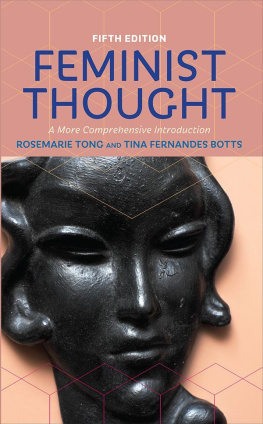Contents

Feminist Antifascism
Feminist Antifascism:
Counterpublics of the Common
Ewa Majewska

First published by Verso 2021
Ewa Majewska 2021
This book was written as a part of the project Early Solidarno and the Black Protests in Theories of Counterpublics and the Subaltern, financed by the Polish National Council of Science, grant no. 2016/23/B/HS2/01338. Some parts of it were made possible by an Institute of Cultural Inquiry (ICI) Berlin research grant, which I was generously offered in 201416.
All rights reserved
The moral rights of the author have been asserted
1 3 5 7 9 10 8 6 4 2
Verso
UK: 6 Meard Street, London W1F 0EG
US: 20 Jay Street, Suite 1010, Brooklyn, NY 11201
versobooks.com
Verso is the imprint of New Left Books
ISBN-13: 978-1-83976-116-4
ISBN-13: 978-1-83976-118-8 (US EBK)
ISBN-13: 978-1-83976-117-1 (UK EBK)
British Library Cataloguing in Publication Data
A catalogue record for this book is available from the British Library
Library of Congress Cataloging-in-Publication Data
A catalog record for this book is available from the Library of Congress
Typeset in Minion by Biblichor Ltd, Edinburgh
Printed and bound by CPI Group (UK) Ltd, Croydon CR0 4YY
This book is dedicated to all those who fight patriarchy.
Order prevails in Warsaw! Order prevails in Paris! Order prevails in Berlin! Every half-century, that is what the bulletins from the guardians of order proclaim from one center of the world-historic struggle to the next. And the jubilant victors fail to notice that any order that needs to be regularly maintained through bloody slaughter heads inexorably toward its historic destiny; its own demise.
Rosa Luxemburg, Order Prevails in Berlin, 1919
Playing the card of naivet, we wanted to affirm that it was still possible to live and to produce revolutionary subjectivity.
Antonio Negri, Postscript to his exchange with Flix Guattari, 2010
CONTENTS
Introduction:
Why Should We Reclaim the Public?
Nevertheless, the desire for being many is nothing to feel bad about.
Sibylle Peters, On Being Many
It might seem that the situation in Europe has changed tremendously since the time Rosa Luxemburg wrote her pamphlet Order Prevails in Berlin. However, while certain things change, much else stays the same. In this book I propose a dismantling of the liberal vision and practice of the public sphere, so as to reclaim the notion of the public and block the growth of fascism. The ideas discussed here amount to a feminist politics of antifascism. However, differently from many books and texts already published on antifascism and the public, this book steps out of the prevailing focus on the Westthe cases discussed here as well as some of the conceptual interventions are drawn from the East and South.
I herein discuss theories of counterpublics (those publics or groups that form and organize through mutual recognition of wider public exclusions so as to overcome those exclusions) and the commonthe social realm, including humans and their capacities, nature, and the cultural goods in cases of political mobilization originating in Poland, such as the early Solidarno (198081) and recent womens protests (2016 onward), for several important reasons. First, while criticism of the one-sidedness and other limitations of world-focused vocabulary has been justifiable, the process caused the notion of the Second World to somehow disappear from political maps. This has produced significant theoretical and historical problems, as the majority of todays world could arguably be classified by this term. Instead, in the name of dismantling dated vocabulary, we entered a world of sharpest distinctions; while this explained and perhaps combatted the most striking remnants of colonial capitalism, by sweeping the supposedly developing countries off the map, it also made new forms of colonialism and imperialism invisible.
This book does not offer solutions to the terminology issues, and I believe some of these problems were resolved in the 1970s by Immanuel Wallersteins notions of center, semi-periphery and periphery, however limiting these words might sound today. In his version of geopolitical theory, the semi-periphery is perhaps the most interestingand most underutilizedconcept. Its supposed dialectic is always already multiplied, allowing its use even after deconstructing world-focused and other stabilizing notions. The semi-periphery always tries to become a part of the center and always makes a tremendous effort, sometimes particularly brutally, to cut any of its associations with the periphery. It is always lured into more prestigious positions and never fully allowed its honors. Poland was listed as one such country by Wallerstein back in the 1970s, andas this book in many ways showshas kept its in-between position, with all the consequences of such situatedness. It will never be fully Western; however, it is in many ways not South, North or East, either. It constantly struggles to become more Western. And the impossibility of accomplishing such a transition is part of the bargain. Perhaps we will always be Europes class B citizens, desperately trying to join the best in the club while disregarding and abusing all those even weaker in the region and globally.
The accuracy of this description somehow proves that the global dynamics did not fully erase the binary oppositionswhile it might shift the power distribution in the world, it did not erase its central mechanisms. My version of postcolonialism adapted here allows for dismantling the hidden presumptions of any notion of globalization; however, it does not submit to the cruel optimism of some anticolonial efforts, in which the polishing of the geopolitical vocabulary tacitly replaced the far more complex struggle for recognition. Such changes, as needed as they truly are, never are enough.
In my analysis, I offer a critique of Jrgen Habermass theory of the public sphere, and liberal political theory more generally, as being based on fundamental exclusions and stabilizing them. The work of Lauren Berlant, particularly her concept of cruel optimism, is important to capture our current disappointment with the conservative line of todays Solidarno, and it also helps to emphasize its optimistic beginnings.
feminism, one that clearly indicates that reproductive rights or gender- based violence are not merely problems of certain conveniently essentialized and exoticized groups, but are of general social importance. I also consider the topic of academia and the feminist counterpublics within it, as we tend to see university-based feminism mainly as theory. In this discussion, I emphasize the internationalism of the feminist movement, as well as the role of new media, for processes of solidarity networks and feminist political agency globally.
This book is rooted in theory as well as in social activism. I discuss the feminist counterpublics in academia in This text can also be seen as an exercise in Marxist-feminist thought, although post-structuralist strategies are also applied.
absenteverybody was protesting in ways they found most convincing and available.
In
In Czech Republic, namely The Power of the Powerless , which considers prospects of ordinary, everyday resistance. Such weak resistance can be seen as the agency fueling counterpublics of the common.








